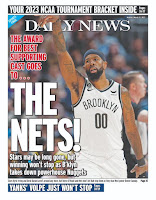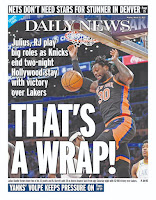As new-look Nets show staying power, the enduring enigma of the Kyrie Irving years. From NY Magazine, a provisional explanation.
 It's been little more than a month since the Brooklyn Nets traded star guard Kyrie Irving to the Dallas Mavericks after they couldn't agree on a contract, leading to the trade of fellow star Kevin Durant and the dismantling of a one-time superteam that, in a 6/2/21 New York Times Magazine, in a profile of Durant, called "(Possibly) the Greatest Basketball Team of All Time" and, as of this past December, before Durant's injury, looked like they could blow through the league.
It's been little more than a month since the Brooklyn Nets traded star guard Kyrie Irving to the Dallas Mavericks after they couldn't agree on a contract, leading to the trade of fellow star Kevin Durant and the dismantling of a one-time superteam that, in a 6/2/21 New York Times Magazine, in a profile of Durant, called "(Possibly) the Greatest Basketball Team of All Time" and, as of this past December, before Durant's injury, looked like they could blow through the league.
The Nets have gone from treading water to being the wave. A month ago they self-detonated a title contender and now find themselves as a team with all the things they couldn’t have with stars: regular availability, no drama and chemistry. Though they’ve weathered life without them well, their ability to do so in the playoffs might define their season.Indeed, Nets fans have begun to move on. Wrote NetsDaily editor "Net Income" (aka Bob Windrem) in a 2/19/23 essay headlined Player empowerment and the good of the game:
Meanwhile, the surprisingly surging New York Knicks have regained primacy over the tabloids' back pages--the New York Daily News, in their earlier edition of today's back page, featured the Nets (above), then shifted to the Knicks.Maybe next time, it will be different. The players the Nets acquire in this new era may have to pass a “loyalty test,” so to speak. Mercurial personalities will be avoided even more now.
In the meantime. KD and Kyrie are all-Stars this weekend facing yet another awkward manifestation of player empowerment: two superstars who got to the game because of what they did for one team while wearing the uniform of another. How’d they do? Don’t know. Didn’t watch.
The Irving saga could lead to endless rounds of whataboutism... if his refusal to get vaccinated let down his teammates and fans, whatabout New York City's inconsistent rules that allowed unvaxxed visiting players?... if his tweeting a link to an antisemitic documentary made him, as owner Joe Tsai tweeted, "currently unfit to be associated" with the Nets, whatabout Tsai's steady defense of the Chinese regime or other NBA owners' association with ugly politics and predatory businesses? (One Twitter user dubbed the owner "Joe Genotsai.")
As with his vaccine holdout, during which he missed nearly half a season, Irving had inflamed a wider debate about the bounds of acceptable behavior in pro sports; about whether public figures should be reprimanded for platforming fringe ideas; about whether, on a galactic scale, RTs = Endorsement.van Zuylen-Wood comes to a conclusion:
If Irving is a once-in-a-generation talent on the court, he’s also deeply of his generation off it — fed by algorithms, drawn to conspiracy, distrustful of a machine even as it makes him rich, more alienated than ever. Irving arrived in Brooklyn considered one of the most enigmatic figures in the NBA, with a mind so internet-pilled and recondite as to be unclassifiable. But he left as a familiar archetype: the loner, the dot-connecting freethinker, clicking around the internet. The kind of person who feels most comfortable when he’s talking to strangers online.
Increasingly consumed with social justice, he was following a familiar arc of online polarization. A tweet from August 2012: “This is cool, I just did it, you should too. Donate $10 to @BarackObama, text GIVE to 62262.” Nine years later: “Only a matter of time until all Natives Africans Asians completely stop producing and entertaining for Racist America and Racist Europe. Only a matter of time … God judges all of their evil actions.”
A number of agents, executives, and assorted NBA figures professed their nonchalance about the saga. “Was I surprised that he tweeted out a random antisemitic documentary? Yeah, a little bit. Then again, if you know the YouTube or Instagram algorithm, what kinds of things get fed to a conspiracy-minded guy like him …,” said one team front-office figure, who happens to be Jewish. “I feel like the antisemitism thing is such a footnote to the whole Kyrie story, another example of him spouting off on things he doesn’t know about. He thinks he’s discovered something nobody else knows.”
The Barclays Center sits a single neighborhood over from Crown Heights. Early in Irving’s tenure, a Rockland County rabbi was stabbed by a reportedly mentally ill Black assailant and later died. The Nets partnered with the Anti-Defamation League to distribute HATE STOPS HERE T-shirts to players. According to Sullivan, the journalist writing a book on the team, only one of the squad’s Black players, a benchwarmer named Theo Pinson, put one on. “There are a lot of things that have been happening over the course of this entire country’s history,” Garrett Temple told Sullivan in the locker room, referencing police brutality. “And there were no shirts specifically for that.” Irving, sitting nearby, said, “That’s what’s up.”



Comments
Post a Comment